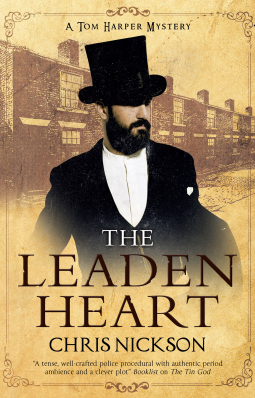The Leaden Heart by Chris Nickson
historical police procedural
publisher: Severn House
publication date: 7/1/2019
Note: I read this book thanks to the generosity of Severn House and Netgalley. I’m particularly excited about reviewing this book because it’s my first ever review for Netgalley.
Summary:
It’s July 1899, Leeds, England. Superintendent Tom Harper knows the recent lull in crime can’t last, but he doesn’t expect that it will be broken by a string of daring house burglaries. Nor does he expect to reunite with his old friend Billy Reed after Reed’s brother dies by suicide. When the grieving widow and his brother search financial records, they find evidence that the new landlords are corrupt. However, the development company is unknown, its identity hidden behind laws and legal protection.
Then there’s a murder. And another, and it’s clear that the closer Harper and his men get to finding the killers, the more brutal the killings are. But the killers aren’t acting on their own. Someone is directing them. Someone who is ruthless, brutal, and powerful, and no one’s beyond the reach of their power.
My thoughts:
When a mystery novel opens with the superintendent of police pondering the recent lull in crime, you know that there’s about to be a crime spree. In Tom Harper’s defense, though, he knows that downward dip in crime is transient.
Then the robberies. Then the suicide, which leads to a Pandora’s box of crime that the police have overlooked. It’s a new type of crime, unfamiliar to these late 19th century cops, but all-too-familiar to those of us in the 21st century. Business and money, more intellectual than physical crimes, bloodless until they turn bloody.
This is a strong novel.
My one issue revolves around the opening.
It’s slow(ish). For those who have read previous Tom Harper novels, this is a time to catch up with old friends. Tom and his family. Billy Reed. The investigators under Harper’s supervision and the chief superintendent. It establishes the status quo. That’s fine, but it felt that it took a long time to get to the main conflict.
While this book works as a stand-alone, there were points where I wished for more background on the falling out between Billy Reed and Tom Harper. Their relationship is obviously strained, but I never knew why. As I haven’t read the previous novels, I felt mystified by the tension in this friendship but thankfully this conflict isn’t so prevalent that it ruined my enjoyment of the rest of the book. However, I sensed that if I knew the backstory of the Reed vs. Harper falling out, I might have better enjoyed the parts from Reed’s point of view.
Those things aside, I was impressed by Nickson’s story.
The characters are deep and complicated.
In particular, Annabelle, Harper’s wife, struck me as a terrific character. As a newly elected “Poor Law Guardian”, she’s dealing with a multitude of conflicts, many of which resonate with modern women. (They certainly did for me.)
- The problem of being the sole female Guardian and the frustration when the men will not listen to her ideas;
- the strains of balancing family, her business (the pub), and her charity work;
- the heartbreak of wanting to make a difference but not knowing how.
She wants to “lean in.”
But as many 21st century women (and their predecessors) have found, that’s only possible with a support circle and compromise. And Annabelle is not a woman to compromise her values. Even though her subplot doesn’t have a lot of page time, Nickson writes it with nuance and depth.
Nickson excels at inserting period details.
He describes without slowing down the story. This is a time period in flux (not unlike our own!) and the tension between the old and new permeates the narrative.
Another aspect I enjoyed was that the police detectives work together as a team.
They support each other. When Harper comes under fire from powerful outsiders, his subordinates and his superior back him up. But Nickson doesn’t fall into the trap of everything being A-okay. The tension and conflict come from the outside. The powerful outsiders. The imminent war in South Africa, which will lure many on the police force to join the army, thus draining the force of experienced people. And of course, the obvious threat of dangerous killers on the loose.
The ending is strong.
While there were points in the story that felt repetitive, this reflects “real” police work. The frustration. The loose threads. The hunches, the dead ends, the long hours of tedium followed by seconds of heart pounding action and fear, and the drained emotions at the end of a case. Conflicts in our lives don’t have neatly wrapped up endings with all questions answered. This book doesn’t, either, but there’s enough closure to feel both realistic and satisfying.
A truly enjoyable book. Highly recommended for fans of historical fiction and mysteries.
4 1/2 stars
Thanks to Netgalley, Severn House, and Chris Nickson for providing a review copy of The Leaden Heart in exchange for an honest review.
Bonus Tips for writers
Tip #1: Pick your details carefully.
This applies to any writer, but especially to those writing historical fiction or fiction set in unfamiliar settings. Nickson doesn’t write lengthy descriptions of time and place, but he makes the time period come alive. Here’s two examples:
When Harper is ushered into a lawyer’s waiting room, he notes that there is
“a secretary whose fingers moved swiftly over the keys of one of the new typewriting machines” (chapter 5).
Words like keys and typewriting machines conjure up a particular image, right? Note that he doesn’t call it a typewriter. It’s “one of the new typewriting machines.” Sounds like Harper, as the point of view character, knows what it is, but he’s unfamiliar with using it. It’s still new and alien.
When Harper and Ash visit the mortuary of the hospital, Nickson writes,
They both knew the place too well, footsteps echoing off the walls as they walked, the grim, harsh stink of carbolic catching at the back of their throats” (chapter 18).
Even if you’re unfamiliar with “carbolic,” the descriptors “grim, harsh stink” says that this is not a smell anyone wants in their nostrils. Carbolic acid and carbolic soap were used as disinfectants, by the way. Note, also that he doesn’t call it “disinfectant” like a lot of us in the 21st century would, possibly because Harper and Ash would’ve been more familiar with carbolic. (It also makes me thankful for lemon-scented Lysol disinfecting spray!)
Tip #2: Try to use more than one physical sense to create your setting. The fewer words, the better.
Notice how Nickson evokes the sense of smell (“grim, harsh stink”), taste (“back of their throats”), and sound (“footsteps echoing off the walls”). I don’t need much more than this to feel like I’m in that hospital, dogging their footsteps, tagging along on their reluctant errand to the morgue and bracing myself for the horror of a dead body. That entire sentence is 28 words long. No need to go off on a multi-paragraph description cataloging every smell, taste, feeling, etc. This is a particular weakness of mine, so I’m preaching to myself!

